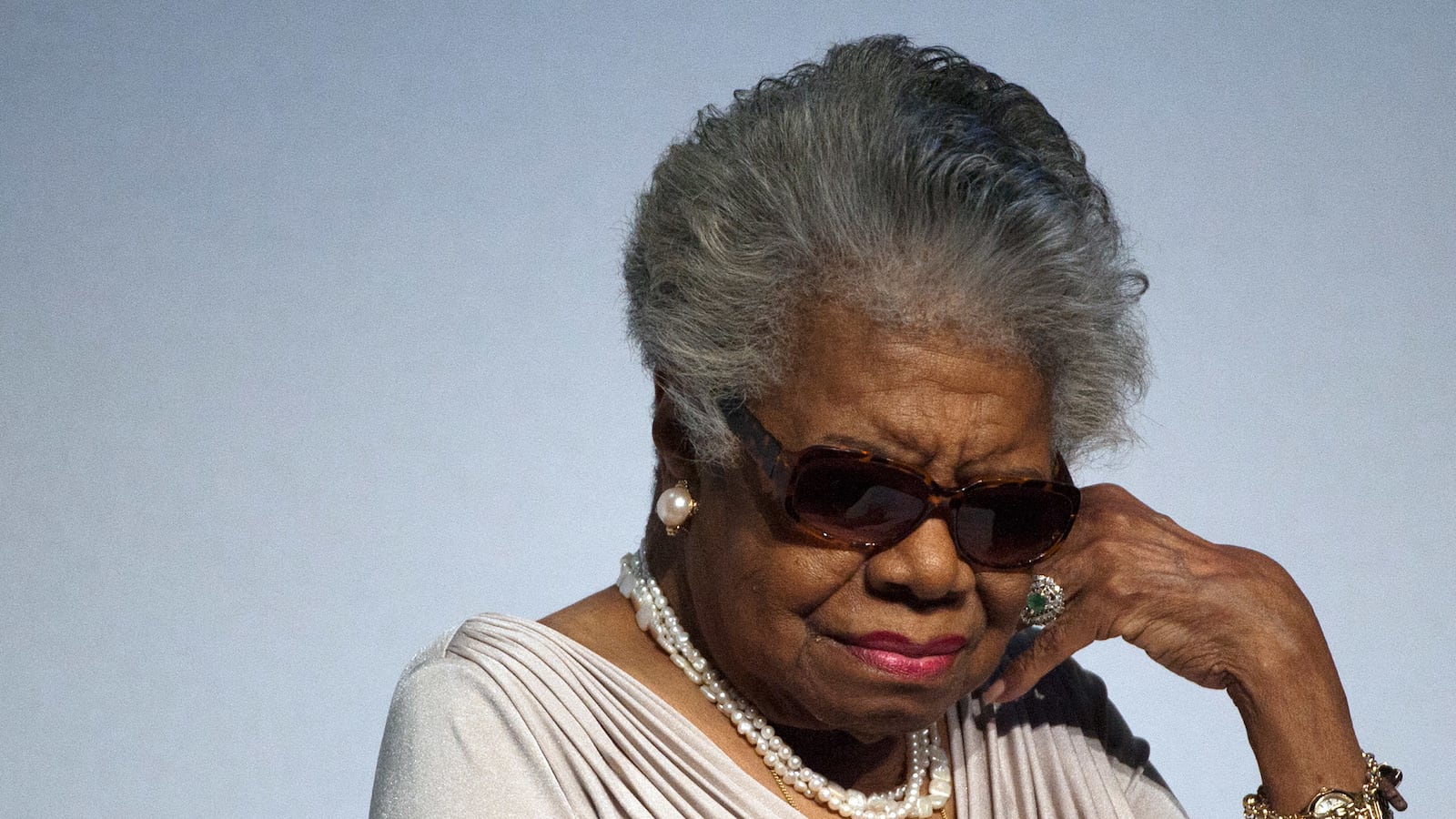The way some of the lawmakers explained themselves, you’d have thought they had just been asked to name the United States Postal Service after Muammar Gaddafi or Bane.
Instead the question was whether to rename a post office in Winston-Salem, North Carolina, after the acclaimed author and civil rights activist Maya Angelou. Nine Republican members of the House of Representatives ended up voting no and one voted present on the bill, which passed with 371 votes.
“Congressman Harris voted against the Maya Angelou post office naming because she was a communist sympathizer,” a spokeswoman for Rep. Andy Harris (R-MD) told NBC News. “His parents escaped communism and he feels that he cannot vote to name a post office in the United States in honor of someone who supported the communist Castro revolution in Cuba.
“Who’s next to get a post office? Jane Fonda?” the spokeswoman added.
Winston-Salem is where Angelou died in 2014 at the age of 86.
“Naming post offices is one of the most benign and bipartisan duties we perform in the House of Representatives, and there is rarely any opposition,” said Rep. Steve Israel (D-NY). The congressman added that he was “shocked today as nine Republicans voted against naming a post office after Maya Angelou, indisputably one of our country’s greatest poets, authors, and civil rights activists.”
Angelou left behind a legacy of fighting against segregation and apartheid. She also supported Democratic candidates such as Hillary Clinton and Barack Obama.
Joining Harris in voting against the bill were fellow Republican Reps. Ken Buck (CO), Mo Brooks (AL), Michael Burgess (TX), Jeff Duncan (SC), Glenn Grothman (WI), Thomas Massie (KY), Alex Mooney (WV), and Steven Palazzo (MS).
“Congress has more important things to be doing rather than spending time naming post offices,” Rep. Burgess said in a statement provided to The Daily Beast. “It has been my experience in the past that these post office namings have been used to honor and remember young men and women who have lost their lives fighting for our country. Yesterday, I was asked to vote to name a post office for a pro-Castro and pro-communist individual and I could not support that.”
Brooks, too, played the communist-sympathizer card.
“While Maya Angelou did many good things in her life, Congressman Mo Brooks… did not believe it appropriate to name an American Post Office after a communist sympathizer and thereby honor a person who openly opposed America’s interest by supporting Fidel Castro and his regime of civil rights suppression, torture and murder of freedom-loving Cubans,” his office told The Washington Post.
Grothman, for his part, voiced his opposition on the House floor, encouraging people to “investigate Maya Angelou a little bit” before deciding on her character and values.
“I’ll suggest perhaps if you want to investigate a little bit further that perhaps you Google ‘Maya Angelou’ and look at other articles in places like [American Thinker or] The American Spectator,” Grothman recommended.
“The fact that she turned left—hard left, embracing Fidel Castro, a murderous tyrant who has impoverished and enslaved his people—was a good career move,” Thomas Lifson blogged for American Thinker a couple days after her death.
“I once spent about 6 hours in close proximity to Ms. Angelou, flying from Atlanta to San Francisco in the first class cabin of Delta jumbo jet,” Lifson continued. “The phony-detector in my head was flashing red almost the entire time. I have never in my life seen so much fawning on the part of flight attendants nor anyone receiving such fawning with quite the same level of apparent belief it was the least that could be offered. Everyone in that cabin was supposed to be aware that a higher being had graced us with her presence.”
It is perfectly fair game to call attention to a celebrity’s flaws, whether that figure is living or recently departed. It is important to remind each other that we shouldn’t deify public figures. Yes, Angelou did go soft on Castro when she was fighting for American civil rights, writing in her memoir The Heart of a Woman that “as black people often said, ‘Wasn’t no Communist country that put my grandpappa in slavery. Wasn’t no Communist lynched my poppa or raped my mamma.’”
But if observers are to assess whether such stances outweigh her accomplishments—the “many good things in her life” to which Rep. Brooks’s office briefly referred—it is at least equally important to revisit her contributions to literature, civil rights activism, and American culture.
These are contributions that apparently now have cross-partisan appeal. She recited poetry at inaugurations of both Obama and Bill Clinton. In 2010, Angelou won the Presidential Medal of Freedom. And George W. Bush said her work “enriched the culture of our country.”
The number of honors and awards she received over a lifetime for her work in the arts, human rights, and feminism is, to put it mildly, impressive.
Three hundred and seventy-one House members agreed that her life’s work was worth the name of a post office in North Carolina. Nine of their colleagues did not.
Because Cuba.






